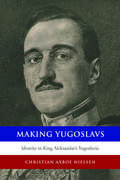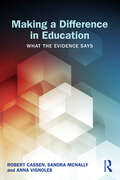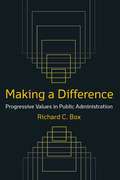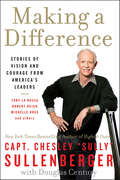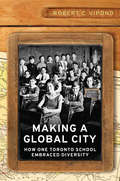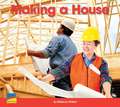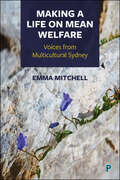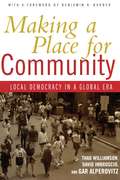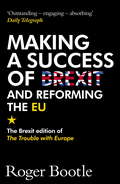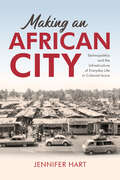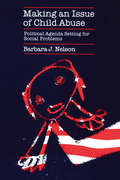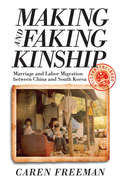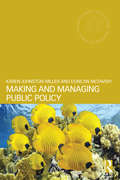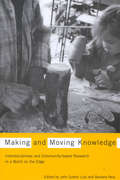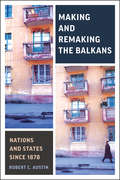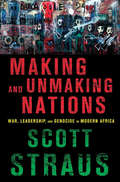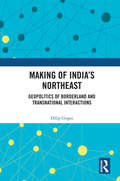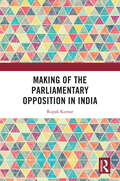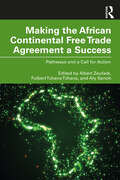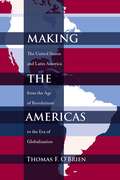- Table View
- List View
Making Young Voters: Converting Civic Attitudes into Civic Action
by D. Sunshine Hillygus John B. HolbeinIn 2016, 90% of young Americans reported an interest in politics. 80% intended to vote. Yet only 43% of people between the ages of 18 and 29 ended up actually casting a ballot. Making Young Voters investigates what lies at the core of this gap. The authors' in-depth, interdisciplinary approach reveals that political apathy is not the reason for low levels of youth turnout. Rather, young people too often fail to follow through on their political interests and intentions. Those with 'noncognitive' skills related to self-regulation are more likely to overcome internal and external barriers to participation. This book combines theory from psychology, economics, child development, and more to explore possible solutions rooted in civic education and electoral reform. This potentially paradigm-shifting contribution to the literature of American politics serves to influence not only our understanding of voter turnout, but also the fundamental connections between the education system, electoral institutions, and individual civic behavior in a democracy. How young people vote affects not only each individual future, but that of the United States, and of us all.
Making Yugoslavs
by Christian Axboe NielsenWhen Yugoslavia was created in 1918, the new state was a patchwork of Serbs, Croats, Slovenes, and other ethnic groups. It still was in January 1929, when King Aleksandar suspended the Yugoslav constitution and began an ambitious program to impose a new Yugoslav national identity on his subjects. By the time Aleksandar was killed by an assassin's bullet five years later, he not only had failed to create a unified Yugoslav nation but his dictatorship had also contributed to an increase in interethnic tensions.In Making Yugoslavs, Christian Axboe Nielsen uses extensive archival research to explain the failure of the dictatorship's program of forced nationalization. Focusing on how ordinary Yugoslavs responded to Aleksandar's nationalization project, the book illuminates an often-ignored era of Yugoslav history whose lessons remain relevant not just for the study of Balkan history but for many multiethnic societies today.
Making a Difference in Education: What the evidence says
by Anna Vignoles Robert Cassen Sandra McNallyWhat is working in education in the UK - and what isn't? This book offers a highly readable guide to what the latest research says about improving young people's outcomes in pre-school, primary and secondary education. Never has this issue been more topical as the UK attempts to compete in the global economy against countries with increasingly educated and skilled work-forces. The book discusses whether education policy has really been guided by the evidence, and explores why the failings of Britain's educational system have been so resistant to change, as well as the success stories that have emerged. Making a Difference in Education looks at schooling from early years to age 16 and entry into Further Education, with a special focus on literacy, numeracy and IT. Reviewing a large body of research, and paying particular attention to findings which are strong enough to guide policy, the authors examine teacher performance, school quality and accountability, and the problematically large social gap that still exists in state school education today. Each chapter concludes with a summary of key findings and key policy requirements. As a comprehensive research review, Making a Difference in Education should be essential reading for faculty and students in education and social policy, and of great interest to teachers and indeed to anyone who wants to know about the effectiveness of UK education policy and practice, and where they should be going.
Making a Difference in Urban Schools
by Jane Gaskell Benjamin LevinWhat can be done to improve the educational experiences of students who live in cities with increasingly high levels of diversity and inequality? Making a Difference in Urban Schools evaluates how school and community leaders have worked to change urban education in Canada for the better over the past fifty years.This analytic and comparative study traces the evolution of urban education in Toronto and Winnipeg from the 1960s onward. Jane Gaskell and Ben Levin identify important contrasts between the experiences in each city as a result of their different demographics, institutional structures, cultures, and politics. They also highlight the common issues and dilemmas faced by reformers in these two cities, across Canada, and globally - including many that persist and remain controversial to this day.
Making a Difference: Practice of Sociology
by Irwin DeutscherEmphasis on measurement techniques can interfere with understanding how well particular social programs in their field work. In Making a Difference: The Practice of Socioloy, Irwin Deutscher links traditional sociological concerns with applied sociology in an effort to overcome this problem. He contributes to the debate over the extent to which health, educational, and social programs initiated by the Roosevelt, Kennedy, and Johnson administrations have been successful in intimate, human terms. Deutscher believes that the introduction of a sociological perspective can provide a positive element to interdisciplinary pursuits. This belief, as well as his fresh perspectives on both the strengths and limitations inherent in applied sociology, offer the field a revitalising lift. As such, this highly informative, thought-provoking volume will be of interest to sociologists and policy makers in health, education, crime, welfare, and housing.
Making a Difference: Progressive Values in Public Administration
by Richard C BoxThis inspirational work encourages Public Administration professionals to participate in progressive social change by advocating progressive values to counter the regressive values currently dominant in American society. The book begins with an analysis of regressive and progressive societal values, and then discusses specific actions PA practitioners, scholars, and teachers can take to build awareness and use of progressive values. The author presents regressive and progressive values in five matched pairs, each representing a continuum of thought and action: aggressiveness and cooperation; belief and knowledge; economics as end, and economics as means; great inequality and limited inequality; and Earth as resource, and Earth as home.
Making a Difference: Stories of Vision and Courage from America's Leaders
by Douglas Century Chesley SullenbergerAs a follow up to his phenomenal New York Times bestselling memoir, Highest Duty, Captain Chesley B. “Sully” Sullenberger explores exactly what it takes to lead and inspire. In Making a Difference, one of the most captivating American heroes of this century—the courageous pilot who brought the crippled US Airways Flight 1549 safely down in New York’s Hudson River—engages some of the most accomplished men and women in the fields of technology, medicine, education, sports, philanthropy, finance, law, and the military in inspiring conversations on true leadership. With powerful thoughts and invaluable guidance from such notables as former Labor Secretary Robert Reich, legendary baseball manager Tony LaRussa, NASA Flight Director Eugene Kranz, and Gov. Jennifer Granholm, Making a Difference is a potential life-changer that stands with Katie Couric’s The Best Advice I Ever Got, Lee Iaococca’s Where Have All the Leaders Gone, Michael J. Fox’s A Funny Thing Happened on the Way to the Future, and other classic volumes that celebrate human achievement and triumph over adversity.
Making a Global City: How One Toronto School Embraced Diversity
by Robert VipondHalf of Toronto’s population is born outside of Canada and over 140 languages are spoken on the city's streets and in its homes. How to build community amidst such diversity is one of the global challenges that Canada – and many other western nations – has to face head on. Making a Global City critically examines the themes of diversity and community in a single primary school, the Clinton Street Public School in Toronto, between 1920 and 1990. From the swift and seismic shift from a Jewish to southern European demographic in the 1950s to the gradual globalized community starting in the 1970s, Vipond eloquently and clearly highlights the challenges posed by multicultural citizenship in a city that was dominated by Anglo-Protestants. Contrary to recent well-documented anti-immigrant rhetoric in the media, Making a Global City celebrates one of the world’s most multicultural cities while stressing the fact that public schools are a vital tool in integrating and accepting immigrants and children in liberal democracies.
Making a House
by Rebecca WeberThis book is about the types and purposes of tools that are used to build houses.
Making a Life on Mean Welfare: Voices from Multicultural Sydney
by Emma MitchellWe are often told that mean welfare is what the public wants. Whether or not that's true, this book encourages us to at least be honest about what that entails. It explores how diverse welfare users navigate the personal and practical hurdles of Australia’s so-called social security system, where benefits are deliberately meagre and come with strings attached. Based on ethnographic fieldwork in a region of Sydney known for ethnic diversity and socio-economic disadvantage, Emma Mitchell brings her own experience of belonging to a poor family long reliant on welfare to her research. This book shows the different cultural resources that people bring to welfare encounters with a sensitivity and subtlety that are often missing in both sympathetic and cynical accounts of life on welfare.
Making a Place for Community: Local Democracy in a Global Era
by Gar Alperovitz Thad Williamson David ImbroscioWhen pundits refer to the death of community, they are speaking of a number of social ills, which include, but are not limited to, the general increase in isolation and cynicism of our citizens, widespread concerns about declining political participation and membership in civic organizations, and periodic outbursts of small town violence. Making a Place for Community argues that this death of community is being caused by contemporary policies that, if not changed, will continue to foster the decline of community. Increased capital flow between nations is not at the root of the problem, however, increased capital flow within our nation is. Small towns shouldn't have to hope for a prison to open nearby and downtown centers shouldn't sit empty as suburban sparwl encroaches, but they do and it's a result of widely agreed upon public policies.
Making a Success of Brexit and Reforming the EU: The Brexit edition of The Trouble with Europe: 'Bootle is right on every count' - Guardian
by Roger Bootle"I recommend our diplomats and ministers read this book: it will provide them with an intellectual backbone. On the big calls [Bootle] has a spectacularly good record." Dominic Lawson, The Sunday Times "Bootle is right on every count." The Guardian HOW BREXIT WILL WORK FOR BRITAIN AND EUROPEMaking a Success of Brexit and Reforming the EU is the extensively revised and expanded new edition of the acclaimed The Trouble with Europe. Following Britain's vote to leave the EU and the ensuing uncertainty in both Europe and the UK, here, one of Britain's best known economists Roger Bootle, charts a way forward for all. For Leavers and Remainers alike, this book analyses the choices the UK faces about its relationship with the EU - and the rest of the world. It discusses the key issues concerning a 'hard' or 'soft' Brexit, Free Trade Agreements, the Single Market and the Customs Union, as well as the principles and pitfalls of the negotiating process. Meanwhile, with or without Brexit, the EU faces an existential crisis. It needs to choose between three different paths: radical reform, further integration or break-up. This book assesses the costs and benefits of each, concluding with a version of how the world would look without the EU. Bootle's exemplary outline of the origins and historical context of the EU is retained from the previous edition, where he acknowledges the remarkable achievements of the EU, before laying out the shortcomings which have led to the parting of the ways with Britain.This is the essential read as the Brexit negotiations progress.
Making an African City: Technopolitics and the Infrastructure of Everyday Life in Colonial Accra
by Jennifer HartIn Making an African City, Jennifer Hart traces the way that British colonial officials, Accra Town Council members, and a diverse group of technocrats used regulation to define what an "acceptable" city looked like. Unlike cities elsewhere on the continent, Accra had a long history of urbanism that predated British colonial presence. By criminalizing some activities and privileging others, colonial officials sought to marginalize indigenous practices of Accra residents and shape the development of a new, "modern" city.Hart argues, however, that residents regularly pushed back, protesting regulations, refusing to participate in newly developed systems, reappropriating infrastructure, demanding rights to city services, and asserting their own informal vision for the future of the city. While urban plans and regulations ultimately failed to substantively remake the city, their effects were and are still felt by urban residents, who are often subject to but not served by urban infrastructure.Making an African City explores how the informalization of Accra's development was a historical process, not a natural and self-evident phenomenon, which connects the history of the city with the history of urban development and the growth of technocracy around the world.
Making an Issue of Child Abuse: Political Agenda Setting for Social Problems
by Barbara J. NelsonIn this absorbing story of how child abuse grew from a small, private-sector charity concern into a multimillion-dollar social welfare issue, Barbara Nelson provides important new perspectives on the process of public agenda setting. Using extensive personal interviews and detailed archival research, she reconstructs an invaluable history of child abuse policy in America. She shows how the mass media presented child abuse to the public, how government agencies acted and interacted, and how state and national legislatures were spurred to strong action on this issue. Nelson examines prevailing theories about agenda setting and introduces a new conceptual framework for understanding how a social issue becomes part of the public agenda. This issue of child abuse, she argues, clearly reveals the scope and limitations of social change initiated through interest-group politics. Unfortunately, the process that transforms an issue into a popular cause, Nelson concludes, brings about programs that ultimately address only the symptoms and not the roots of such social problems.
Making and Bending International Rules: The Design of Exceptions and Escape Clauses in Trade Law
by Krzysztof J. PelcAll treaties, from human rights to international trade, include formal exceptions that allow governments to legally break the rules that they have committed to, in order to deal with unexpected events. Such institutional 'flexibility' is necessary, yet it raises a tricky theoretical question: how to allow for this necessary flexibility, while preventing its abuse? Krzysztof Pelc examines how designers of rules in vastly different settings come upon similar solutions to render treaties resistant to unexpected events. Essential for undergraduate students, graduate students, and scholars in political science, economics, and law, the book provides a comprehensive account of the politics of treaty flexibility. Drawing on a wide range of evidence, its multi-disciplinary approach addresses the paradoxes inherent in making and bending international rules.
Making and Faking Kinship: Marriage and Labor Migration between China and South Korea
by Caren FreemanIn the years leading up to and directly following rapprochement with China in 1992, the South Korean government looked to ethnic Korean (Chosǒnjok) brides and laborers from northeastern China to restore productivity to its industries and countryside. South Korean officials and the media celebrated these overtures not only as a pragmatic solution to population problems but also as a patriotic project of reuniting ethnic Koreans after nearly fifty years of Cold War separation. As Caren Freeman's fieldwork in China and South Korea shows, the attempt to bridge the geopolitical divide in the name of Korean kinship proved more difficult than any of the parties involved could have imagined. Discriminatory treatment, artificially suppressed wages, clashing gender logics, and the criminalization of so-called runaway brides and undocumented workers tarnished the myth of ethnic homogeneity and exposed the contradictions at the heart of South Korea’s transnational kin-making project. Unlike migrant brides who could acquire citizenship, migrant workers were denied the rights of long-term settlement, and stringent quotas restricted their entry. As a result, many Chosǒnjok migrants arranged paper marriages and fabricated familial ties to South Korean citizens to bypass the state apparatus of border control. Making and Faking Kinship depicts acts of "counterfeit kinship," false documents, and the leaving behind of spouses and children as strategies implemented by disenfranchised people to gain mobility within the region’s changing political economy.
Making and Managing Public Policy (Masters in Public Management)
by Karen Johnston Miller Duncan McTavishUnderstanding how public policy is made and managed is a key component in studying the disciplines of public management and administration. Such are the complexities associated with this topic, a deeper understanding is vital to ensure that practising public managers excel in their roles. This textbook synthesizes the key theories, providing a contemporary understanding of public policy and how it relates to private and other sectors. It integrates this with the management and implementation of public policy, including outlines of organizations, practices and instruments used. Pedagogical features include chapter synopses, learning objectives, boxed international cases and vignettes and further reading suggestions. This useful, concise textbook will be required reading for public management students and all those interested in public policy.
Making and Moving Knowledge
by Barbara Neis John Sutton LutzIt has been clear for some time that research does not automatically translate into knowledge, nor does knowledge necessarily translate into wisdom. Whether the immediate challenge is global warming, epidemic disease, poverty, environmental degradation, or social fragmentation, research efforts are wasted if we cannot devise efficient and understandable processes to create and transfer knowledge to policy makers, interested groups, and communities. How to maximize the impact of scholarly research and combine it with practical knowledge already available in lay communities are key issues in a world threatened with social-ecological disasters. Making and Moving Knowledge focuses directly on how knowledge is created and transferred or is blocked and atrophies. It places knowledge generated by universities and governments beside practical knowledge from coastal aboriginal and non-aboriginal communities and looks at how different kinds of knowledge flow in different directions. Concentrating on intellectually fertile spaces at the edges of disciplines and the rich socio-ecological interfaces where land meets sea, authors demonstrate their commitment to knowledge transfer in their work, showing how knowledge transfer can be considered theoretically, methodologically, and practically
Making and Moving Knowledge: Interdisciplinary and Community-based Research in a World on the Edge
by Barbara Neis John Sutton LutzIt has been clear for some time that research does not automatically translate into knowledge, nor does knowledge necessarily translate into wisdom. Whether the immediate challenge is global warming, epidemic disease, poverty, environmental degradation, or social fragmentation, research efforts are wasted if we cannot devise efficient and understandable processes to create and transfer knowledge to policy makers, interested groups, and communities. How to maximize the impact of scholarly research and combine it with practical knowledge already available in lay communities are key issues in a world threatened with social-ecological disasters. Making and Moving Knowledge focuses directly on how knowledge is created and transferred or is blocked and atrophies. It places knowledge generated by universities and governments beside practical knowledge from coastal aboriginal and non-aboriginal communities and looks at how different kinds of knowledge flow in different directions. Concentrating on intellectually fertile spaces at the edges of disciplines and the rich socio-ecological interfaces where land meets sea, authors demonstrate their commitment to knowledge transfer in their work, showing how knowledge transfer can be considered theoretically, methodologically, and practically."
Making and Remaking the Balkans: Nations and States Since 1878 (Munk Series on Global Affairs)
by Robert Clegg AustinWith more than 25 years since the collapse of communism, the end of the wars and billions of dollars in aid, the Balkans are still characterized by corruption, state capture, and decidedly unmodern states that are often either weak or authoritarian. Taking the contemporary Balkans as a starting point, Making and Remaking the Balkans studies the region’s history combined with observations based on more than twenty years of field experience. Primarily concerned with current issues in the Balkans since 1989, this book explains why the region has endured such a prolonged and fraught transition to democracy and eventual membership in the European Union. The young and educated have largely left. Governmental crisis and economic stagnation is the norm and much-needed regional cooperation has been suppressed by renewed nationalism. Wars on corruption have proved to be largely rhetorical. Making and Remaking the Balkans offers a systematic study of the issues the entire region faces as it struggles to complete the European integration process at a time when the European Union faces bigger problems elsewhere.
Making and Unmaking Nations: The Origins and Dynamics of Genocide in Contemporary Africa
by Scott StrausIn Making and Unmaking Nations, Scott Straus seeks to explain why and how genocide takes place--and, perhaps more important, how it has been avoided in places where it may have seemed likely or even inevitable. To solve that puzzle, he examines postcolonial Africa, analyzing countries in which genocide occurred and where it could have but did not. Why have there not been other Rwandas? Straus finds that deep-rooted ideologies--how leaders make their nations--shape strategies of violence and are central to what leads to or away from genocide. Other critical factors include the dynamics of war, the role of restraint, and the interaction between national and local actors in the staging of campaigns of large-scale violence. Grounded in Straus's extensive fieldwork in contemporary Africa, the study of major twentieth-century cases of genocide, and the literature on genocide and political violence, Making and Unmaking Nations centers on cogent analyses of three nongenocide cases (Côte d'Ivoire, Mali, and Senegal) and two in which genocide took place (Rwanda and Sudan). Straus's empirical analysis is based in part on an original database of presidential speeches from 1960 to 2005. The book also includes a broad-gauge analysis of all major cases of large-scale violence in Africa since decolonization. Straus's insights into the causes of genocide will inform the study of political violence as well as giving policymakers and nongovernmental organizations valuable tools for the future.
Making of India's Northeast: Geopolitics of Borderland and Transnational Interactions
by Dilip GogoiThis book examines India’s Northeast borderland – strategically positioned at the confluence of South Asia, East and Southeast Asia – from the perspective of international relations. The volume interrogates the geopolitics of region-making in both colonial and postcolonial times and traces the transformation of Northeast India from a British strategic frontier into a securitised borderland. It situates the region in transnational interactions both in conflict and cooperation with its immediate neighbouring regions of China, Bangladesh, and Myanmar, especially in the context of India’s Look East/Act East policy. The volume paves the way for a new ‘region-state’ framework borne out of the constructivist worldview and offers answers to many conundrums centring border studies. It further delineates approaches to overcoming the present geopolitical and territorial challenges of India’s Northeast with a critical thrust on regional policymaking. The volume will be of interest to students and researchers in the disciplines of social sciences and humanities in India as well as South and Southeast Asia. It will be especially useful to those in politics and international relations, strategic studies, international political economy, foreign policy, development studies and regional development, besides foreign policy-makers and diplomats, development practitioners, economists and policy analysts.
Making of the Parliamentary Opposition in India
by Rupak KumarThis book is a detailed historical and analytical account of the making of parliamentary opposition in Independent India, based on a wide range of sources, including the memoirs of politicians and their writings in the popular press. Historically, the book examines the working of the Opposition in four phases –the Formative Phase (1952-1966), the Resilience Phase (1967-1984), the Consolidation Phase (1985-1999), and the Fragmentation Phase (1999-2014); parallelly, the question of the Opposition is framed in two facets: as democracy’s necessity and as governance imperative. It shows how the representational assertion in Indian politics enabled the expansion of the Opposition, but by generating fragmentation and making ideologically-neutral coalitions both possible and necessary, it also contributed to its weakening as a mechanism of exacting accountability.This book invites the reader to reimagine the idea of democracy, political system, governance from the perspective of the opposition. Why is the Opposition essential? What is the constitutional and institutional protection to ensure an effective and vibrant opposition under one party dominant system? It also adopts a narrative style, making it accessible to all kinds of readers.This book will be useful to those interested in understanding Indian politics, democracy, political processes and institutions. Students, researchers, academics of political science, governance and policy makers will find this work engaging.
Making the African Continental Free Trade Agreement a Success: Pathways and a Call for Action
by Edited ByAlbert Zeufack Fulbert Tchana Tchana Aly SanohIn 2019, African heads of state and governments launched in fanfare the African Continental Free Trade Agreement (AfCFTA), a historic agreement for economic transformation across the continent. But now comes the hard bit: how to make the agreement a success?In this book, senior experts from across the world come together to provide a comprehensive analysis of the conditions needed for AfCFTA to successfully spur economic development in Africa. It puts forward three foundations for success: demography dividend, digital economy, and economic diversification. In addition to trade policy, the book recommends that African policymakers should strengthen fiscal and monetary policy coordination, adopt and implement the appropriate regulatory environment, and build suitable connectivity infrastructure. The stakes are high. If implemented correctly, the book argues that AfCFTA could speed up trade within Africa, which could double every five years. Success would mean growth, investment, changing trade patterns, jobs, economic transformation, poverty reduction, and a continental market for services.Driven by concrete, evidence-based strategies for long-term growth, this book is an essential read for policy makers, development practitioners, economics researchers, and everyone with an interest in the future of Africa.
Making the Americas: The United States and Latin America from the Age of Revolutions to the Era of Globalization (Diálogos Series)
by Thomas F. O'BrienAmericans' belief in their economic, political, and cultural superiority launched them on a mission to transform Latin America that has evolved into a global process of Americanization. From corporate and philanthropic initiatives to military interventions, Americans motivated by self-interest and idealism sought to reshape Latin America and gave birth to the American driven process of globalization. Synthesizing a broad range of international relations scholarship, including perspectives from gender, race, and cultural studies, O'Brien offers a sweeping history of the Americas that ranges from the adventures of eighteenth-century whaling men to the contemporary struggle over globalization. As a part of this study, the author explains how the responses of Latin Americans to Americanization have varied from the vehement rejection of U.S. economic dominance to embracing as well as reconfiguring the icons of American consumer culture. O'Brien's goal is to provide readers with a nuanced understanding of how the people of the Americas have shaped their own history, and influenced the development of U.S. economic, strategic, and cultural power in the world today.

